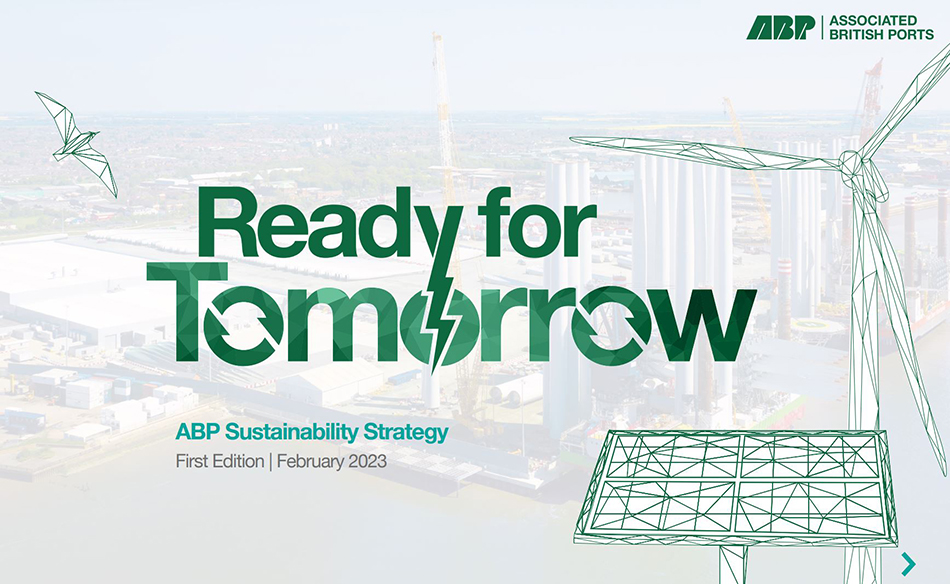Download the full ABP Ready for Tomorrow sustainability strategy document here.
Associated British Ports (ABP), the UK’s leading ports group, has today launched its wide ranging new sustainability strategy, Ready for Tomorrow (RFT), backed by a plan to invest around £2 billion in decarbonising its own operations by 2040 at the latest and in major infrastructure projects to enable the wider UK energy transition.
Ready for Tomorrow looks both internally at ABP’s own operations and outwards, to building greater partnership and collaboration to meet the challenges and grasp the generational opportunities of sustainability.
Henrik L. Pedersen, ABP’s Chief Executive Officer, said: “Climate change is an era-defining challenge, but it is also an opportunity to scale innovative new industries to leave an optimistic legacy for generations to come.
“ABP is ready for tomorrow. We are committed to working together with industry partners and authorities to turn this generational crisis into a generational opportunity: to create a decarbonised, dramatically more sustainable future and deliver the significant investment, economic growth and thousands of new, good jobs that should come with it.”
For ABP’s own operations Ready for Tomorrow identifies five focus areas for action: Net Zero, air quality, biodiversity, waste and water management. Each focus area has a programme of action plans - including action ideas from ABP’s employees in our ports and other locations – to achieve ambitious but credible targets. This includes a commitment to reach Net Zero from ABP’s own operations (Scopes 1 and 2) by 2040.
Maritime Minister Baroness Vere, said: “The UK is a pioneer in cutting-edge clean maritime solutions, with hundreds of millions of pounds of government funding being invested in developing greener, cleaner vessels and infrastructure.
“However, it’s vital that industry also invests in our future, and I’m therefore very pleased to see Associated British Ports doing just that, ensuring we’re Ready for Tomorrow and injecting billions into decarbonising our maritime sector.”
Ready for Tomorrow embraces the fact that ports, and in particular ABP, as the UK's largest ports operator, have a vital and unique enabling role for a range of major decarbonisation and sustainability projects. For ABP this includes continuing to develop its leading offshore wind manufacturing and support hubs in the Humber and East Anglia, as well as more than doubling its own green power generation.
ABP’s future major projects portfolio, along with industrial partners, includes bold, transformational developments in South Wales, the Solent, Humber and East Anglia. These cover floating offshore wind (including a major integration port hub centred on Port Talbot), hydrogen, carbon capture and storage, industrial decarbonisation and alternative fuels.
ABP’s £2 billion green growth and decarbonisation plan brings together projects that will deliver major emissions reduction and sustainability improvements for ABP itself with green growth energy transition projects developed in partnership with customers.
The strategy acknowledges that the scale of the challenges but also the opportunities for the UK from the imperative to decarbonise and become dramatically more sustainable is enormous. It’s bigger than any one company or organisation. Addressing climate change challenges meaningfully and fully capturing the opportunities will require collaboration and partnership. That's an ethos that ABP is committed to.
Nick Molho, Executive Director of the Aldersgate Group, a sustainable business organisation whose members have a cumulative turnover of around £600bn, said: “The launch of ABP’s sustainability Strategy marks an important moment in the UK economy’s transition to net zero emissions. Decarbonising ports is not only important in itself, but it is also essential to support the decarbonisation of other key parts of the economy such as energy generation, shipping and heavy industries like steel.
“By taking proactive steps to cut emissions in a part of the economy that is complex to decarbonise, ABP is demonstrating true leadership and showing that that the business community is ready to lead the UK economy to net zero. The Government must respond by showing equivalent leadership in the coming months through strengthening the UK’s net zero strategy.”
Partnership also requires Government to play a vital enabling role. To develop a supportive, collaborative and consistent policy environment, to progress approvals and consents in a timely manner and to, on occasion, deploy pump priming or bridging support in cases of market failure.
Seeking to address sustainability in the broadest sense, ABP is not only aiming to make environmental improvements, it is also looking to strengthen its role in adding long-term value to the UK economy and society. Building a sustainable society is important to ABP, as it strives to use its evolving, leading role as a further catalyst for investment, quality job creation and prosperity in the communities in which it operates.


